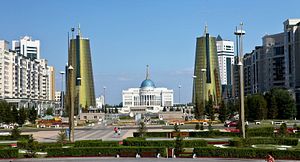Toktar Tuleshov, according to Kazakh authorities, was the force behind the spring Land Code protests. And those protests, the state has argued, were nothing less than a coup attempt. On July 11, the Kazakh National Security Committee (KNB), announced it had finished its investigation into Tuleshov and 25 others and laid out its findings. The plot described by the authorities is a movie-quality crime-lord epic, until it takes a strange turn into political theater.
Tuleshov, a wealthy Kazakh businessman often cited as pro-Russian, was arrested in January. Authorities did not say what the charges were at the time but did say they’d found narcotics and firearms in the homes of Tuleshov and three of his associates. These were boilerplate accusations; often when Astana detains a dissident or activist, drugs or weapons are the declared reason (without much evidence, in many cases).
In June, the state accused Tuleshov of orchestrating the Land Code protests–from jail. According to the Kazakh government, Tuleshov’s aims were nothing less than a seizure of power.
The conspiracy detailed by KNB spokesman Ruslan Karasev Monday–reported by Vlast and EurasiaNet–was convoluted to say the least: involving a crime syndicate, the Brothers’ Circle, that may or may not exist but is nonetheless a group of Eurasian kingpins the subject of U.S. sanctions; a network of businesses in everything from brewing to film to agriculture; and a birthday party as cover for weapons demonstrations. A piece of evidence, apparently, is a picture of Tuleshov looking at the presidential palace, demonstrating his ambitions to high office. (Nevermind that the Akorda is one of the most iconic landmarks in Astana). Further suspicions are cast on his work to make himself a successful businessman and a well-known influencer of public opinion.
The link between Tuleshov as an ambitious businessman–possible crime lord–to Tuleshov as a coup-maker is thin.
But the KNB is convinced. Tuleshov apparently studied up on both Kyrgyz revolutions and was determined to provoke mass riots and issue an ultimatum to the state to make himself vice president. The next step is obvious: when Nazarbayev eventually died Tuleshov would take over.
It’s a fantastic story–and I would definitely watch that movie–but does it actually explain reality? A wealthy businessman jumping into politics is a common global occurrence, and other Kazakh businessmen have been tied to transnational criminal networks and epic corruption schemes. The jump from crime lord to coup-maker is nonetheless a big one and Kazakhstan’s own initial reactions to the protests demonstrated either that they were organic–as activists would argue–or that the government’s criminal justice system is so porous that a man could easily orchestrate nationwide protests from behind bars.
The Land Code protests were notable for their widespread occurrence–nearly every major city in the country had some kind of protest–and at first for the government’s measured response. Early protests were not broken up by security forces and in early May, Kazakh President Nursultan Nazarbayev responded by punting the implementation of the offending Land Code changes into 2017. It appeared that government was trying to be responsive to the public. But the protests had taken on larger issues and activists didn’t want to let up pressure; it was only as May 21 approached that Kazakhstan’s tone shifted. Activists were arrested ahead of May 21, and hundreds detained the day of. While a handful remain in detention, likely to face charges and conviction of inciting discord, most were released within days. The government began spinning a coup narrative after a brief mention of nefarious outside organizers, following unrelated violence in Aktobe (the work of terrorists, according to Astana). Tuleshov’s name popped up as responsible for the protests.
As EurasiaNet noted, Tuleshov’s case–when it goes to trial–will draw considerable attention because of the links the government has insisted exist between Tuleshov’s (more believable) alleged criminal activities and his (less believable) coup ambitions.































